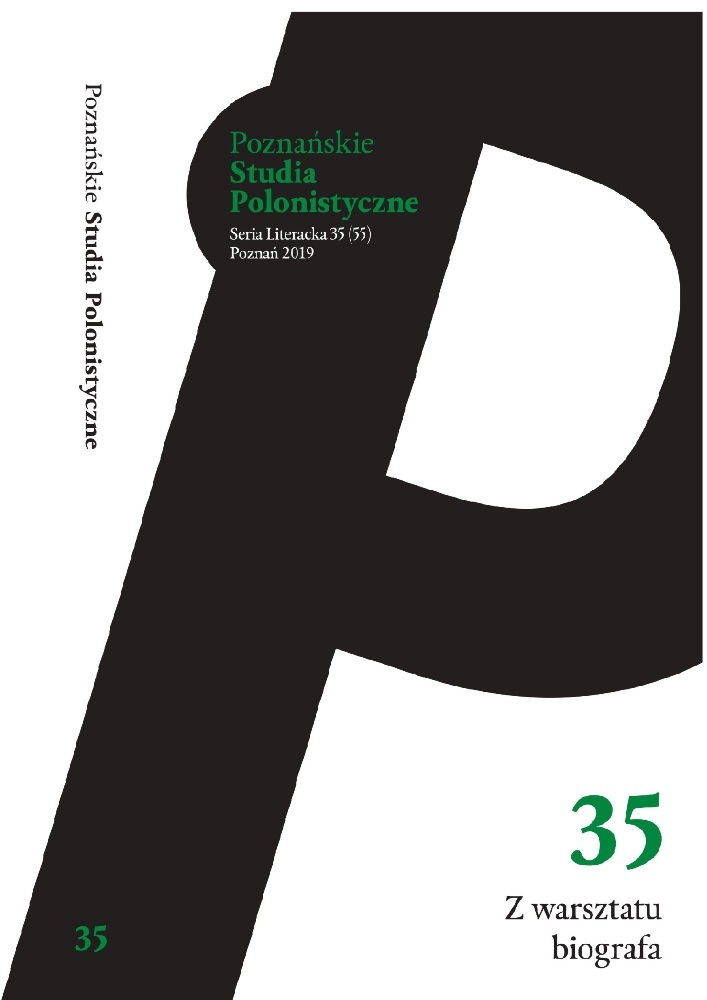Abstract
The article is an attempt to analyze the narrative and methodological techniques of new historicism. The basis for the analysis was Stephan Greenblatt’s book Will In the Word. How Shakespeare Became Shakespeare, especially because of of creating biographical and intercultural areas. The author of the analysis follows the relations between the truth of narration and historical truth and tries to determine the constituent elements of Hamlet’s author. The author of the analysis traced the relations between two truths: the truth of the historical time and the truth of the narrative time.
References
Deleuze Gilles (2004), Foucault, przeł. i oprac. Michał Gusin, Wydawnictwo Naukowe Dolnośląskiej Szkoły Wyższej Edukacji TWP, Wrocław.
Greenblatt Stephen (2006), Poetyka kulturowa. Pisma wybrane, oprac. Krystyna Kujawińska-Courtney, Universitas, Kraków.
Greenblatt Stephen (2007), Shakespeare. Stwarzanie świata, przeł. Barbara Kopeć-Umiastowska, W.A.B., Warszawa.
Greenblat Stephen (2013), Hamlet in Prugatory, Princeton University Press, New Jersey [USA].
Heck Dorota (1997), Wokół nowego historycyzmu, „Pamiętnik Literacki”, z. 2, s. 97-111.
Jackson James Robert de Jager (2017), Historical criticism and the meaning of text, Routledge Taylor & Francis Group, London [Wielka Brytania].
Kujawińska-Courtney Krystyna (2006), Wprowadzenie, w: Stephen Greenblatt, Poetyka kulturowa. Pisma wybrane, Universitas, Kraków, s. 5-82.
Kwietniewska Małgorzata (1991), Koncepcja „episteme” we wczesnych pismach Michaela Foucault, „Archiwum Historii Filozofii i Myśli Społecznej”, t. 36, s. 135-156.
Markowski Michał Paweł (2006), Historyzm, w: Anna Burzyńska, Michał Paweł Markowski, Teorie literatury XX wieku. Podręcznik, Znak, Kraków, s. 497-517.
Meillassoux Quentin (2015), Po skończoności. Esej o koniecznej przygodności, oprac. Alain Badiou, przeł. Piotr Herbich, Fundacja Augusta hrabiego Cieszkowskiego, Warszawa.
Schrift Alan D. (1990), Nietzsche and question of interpretation, Routledge, New York [Stany Zjednoczone].
Sendyka Roma (2010a), Anegdota i poetyki „New Historicism”, w: Zapisywanie historii. Literaturoznawstwo i historiografia, red. Włodzimierz Bolecki i Jerzy Madejski, IBL PAN, Warszawa, s. 33-47.
Sendyka Roma (2010b), Stephen Greenblatt i studia kulturowe, w: Kulturoznawstwo dyscyplina bez dyscypliny?, red. Wojciech Józef Burszta, Michał Januszkiewicz, Wydawnictwo Szkoły Wyższej Psychologii Społecznej „Academica”, Warszawa, s. 182-197.
Waroszczak Piotr (2014), Fikcjonalizm modalny, Ośrodek Myśli Filozoficznej, Warszawa.
License
Authors
Authors of texts accepted for publication in „Poznańskie Studia Polonistyczne. Seria Literacka” are required to complete, sign and return to the editor's office the Agreement for granting a royalty-free license to works with a commitment to grant a CC sub-license.
Under the agreement, the authors of texts published in „Poznańskie Studia Polonistyczne. Seria Literacka” grant the Adam Mickiewicz University in Poznań a non-exclusive, royalty-free license and authorize the use of Attribution-NoDerivatives 4.0 International (CC BY-ND 4.0)Creative Commons sub-license.
The authors retain the right to continue the free disposal of the work.
Users
Interested Internet users are entitled to use works published in „Poznańskie Studia Polonistyczne. Seria Literacka” since 2016, for non-commercial purposes only, under the following conditions:
- attribution - obligation to provide, together with the distributed work, information about the authorship, title, source (link to the original work, DOI) and the license itself.
- no derivatives - the work must be preserved in its original form, without the author's consent it is not possible to distribute the modified work, such as translations, publications, etc.
Copyrights are reserved for all texts published before 2016.
Miscellaneous
Adam Mickiewicz University in Poznań retains the right to magazines as a whole (layout, graphic form, title, cover design, logo etc.).
